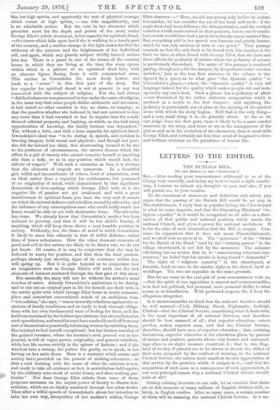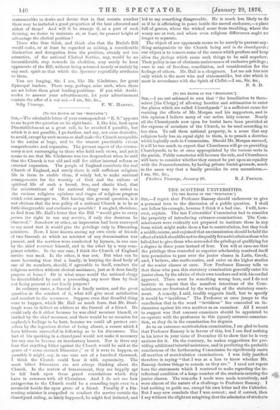LETTERS TO THE EDITOR.
[To THE EDITOR OF THE SPECTATOR."] Sin,—After reading your remonstrance addressed to us of the Clergy very carefully, and doing my best to reach a right conclu- sion, I venture to submit my thoughts to you, and also, if you will permit me, to your readers.
To the exactness of statement and definition with which you argue that the passing of the Burials Bill vould be no step in Disestablishment, I reply that in popular feeling the Church-yard is what its name imports, and that the Dissenting Ministers' "re- ligious equality" in it would be recognised on all sides as a dimi- nution of that public and national position which marks the national Church, and gives it power for national usefulness. It is for the sake of such diminution that the Bill is sought. Con- vince its supporters that it does not mean Disestablishment, and we shall hear no more of it. The " grievance " of the "Order for the Burial of the Dead," read by the "country parson" in the village churchyard, is not felt by the mourners. The minister officiating has no notion that he is " manceuvring reluctant con- sciences," no belief that his service is being found" distasteful."
The right of "religions equality" in the churchyard, at funerals, leads at once to the similar right in the church itself at weddings. The two are arguable on the same grounds.
But let me come to the real gist of your remonstrance with us, —that the spirit of our opposition is narrow and unstatesmanlike, is in fact not political, but personal, mere personal dislike to what seems to us humiliation. With profound respect, Sir, I deny the allegation altogether.
Is it =statesmanlike to think that the national Services should be well manned—Civil, Military, Naval, Diplomatic, Judicial, Clerical—that the Clerical Service, considering what it deals with, is the most important of all national Services, and therefore should be best manned of all ; that superior education, cogeris paribus, makes superior men, and that the Clerical Service, therefore, should have men of superior education ; that, omitting limitations, superior education is the education given by parents of means and position, parents whose very homes and surround- ings often in no slight measure constitute it ; that in this Eng- land of to-day, if parents are to be drawn to devote the ablest of their sons, prepared by the costliest of training, to the national Clerical Service, the nation must manifest its own appreciation of that service by the position which it assigns to it,—and that the acquisition of such sons, as a consequence of such appreciation, is one very principal reason why a national Clerical Service should exist at all ?
Setting existing interests on one side, let us consider that there are at this moment so many millions of English children still, or lately, in English cradles. After so many years, a certain number of them will be manning the national Clerical Service. Is it un-- statesmanlike to desire and devise that in that certain number there may be included a good proportion of the best educated and ablest of them? And will it be strange if, as a part of such devising, we desire to maintain at, at least, its present height of advantage the clerical position?
Those who thus think, and think also that the Burials Bill would make, or at least be regarded as making, a considerable diminution and derogation from the position, already not too attractive, of the national Clerical Service, nay, would be no inconsiderable step towards its abolition, may surely be keen opponents of the Bill, without being actuated merely or mainly by any such spirit as that which the Spectator regretfully attributes to them.
You are longing, Sir, I see, like Mr. Gladstone, for great Episcopal leaders. There may, perhaps, arise such, when there are set before them great leading positions. If you wish Archi- medes to answer your advertisement, let your advertisement contain the offer of a Troi; errii .—I am, Sir, &c.,







































 Previous page
Previous page